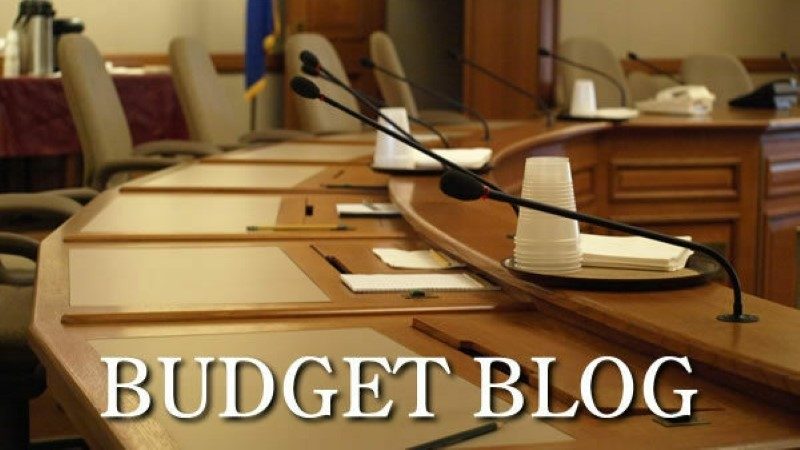The Joint Finance Committee wrapped up its work on an $111.1 billion budget today by approving a package that includes $1.4 billion in new state money to cover Medicaid costs, a series of transportation-related fee increases and the eventual closure of Green Bay’s prison.
A significant portion of the package reflects the deal that Dem Gov. Tony Evers struck with GOP legislative leaders on education, child care and pieces of the Department of Transportation budget.
The GOP motion — approved 13-3 — also included $124.8 million for a new youth prison in Dane County to house the most serious offenders and $55.5 million in borrowing for the second phase of an expansion at the Mendota Mental Health Institute. Both are considered key steps in eventually closing the troubled youth prisons in northern Wisconsin. It also includes $15 million for planning and other steps to close the Green Bay prison in 2029. The projects were part of a nearly $2.7 billion capital budget included in the motion.
Dem state Sen. LaTonya Johnson, of Milwaukee, joined Republicans in supporting the motion.
The committee then voted 12-4 on final passage of the committee’s budget before sending it to the full Legislature for votes later this week.
The Legislative Fiscal Bureau said the budget the committee produced would spend $111.1 billion in all funds. The guv had proposed a $119.9 billion in spending through all funds, including federal money.
LFB said the committee’s proposal would leave an $829 million gross balance at the end of the 2025-27 budget. Even with that cushion, the state would see a $1.2 billion structural deficit heading into the next two-year period, a measure of current revenues compared to future spending commitments.
The 51-page motion includes increasing vehicle title fees by $50 to $207 and driver’s licenses by $8.50 to $32.50. It also proposes new revenue from higher registration fees on vehicles weighing more than 6,000 pounds and for new license plate options.
Committee members offered a mix of praise and criticism for the package.
State Rep. Deb Andraca, D-Whitefish Bay, said while the GOP motion partly represents a compromise with Evers, it still fell short in many areas, particularly education. She said while the deal includes more money for special education than what the committee had previously approved, the GOP motion would add another $9.7 million for choice and charter schools while not putting any more money into general school aids — the biggest pot of money the state uses to provide resources to local districts.
“I just don’t think we’re necessarily putting forth our best effort, particularly at a time when we’re sitting on a $4 billion surplus,” Andraca said. “We just really need to ask, ‘Is this the best that we can do?’”
Meanwhile, state Rep. Shannon Zimmerman, R-River Falls, bemoaned what he said was his Dem colleagues’ focus on spending. He called the budget process “the greatest single theater in the state of Wisconsin” with exaggeration, drama and fiction. That includes Dem arguments that Evers had proposed a balanced budget without mentioning the $2.7 billion in tax increases he included to do that.
“Spending can’t be the only measure of how we solve problems,” Zimmerman said, adding Dems believe money is always the answer and “that isn’t necessarily the case.”
The motion added details to some of the provisions that the guv and legislative leaders announced yesterday. Assembly Speaker Robin Vos, R-Rochester, touted new policies that would increase the required teaching load for Universities of Wisconsin faculty unless they buy down the requirement.
According to the motion, starting Sept. 1, 2026, full-time faculty and academic staff would be required to teach no fewer than 24 credits per academic year. If on a 12-month contract, they would need to teach an additional six credits.
Faculty and staff who are top researchers would be allowed to teach 12 credits per academic year.
The motion also would require the Board of Regents to develop a policy that would allow instructional employees to lower their minimum credit requirement by reducing their salary and benefits proportionally.
According to the Legislative Fiscal Bureau, the motion includes $239 million for the Universities of Wisconsin. That includes: $94 million for pay increases, $54 million to retain and recruit staff, $90 million in state aid for operations and $1 million from interest on COVID-19 funds for a projection at UW-Green Bay.
When briefing reporters yesterday, the guv’s office said the package included $256 million in new money for the system.
Republicans said they had a tough time with providing any increase to UW after their side had floated an $87 million reduction. The system had requested an increase of $855 million, which was backed by Evers.
“There are pieces in there that make me gnash my teeth a little,” said state Sen. Eric Wimberger, R-Oconto. “UW stuck in my craw for a little, but I think it’s a good win for everybody considering the circumstances.”




